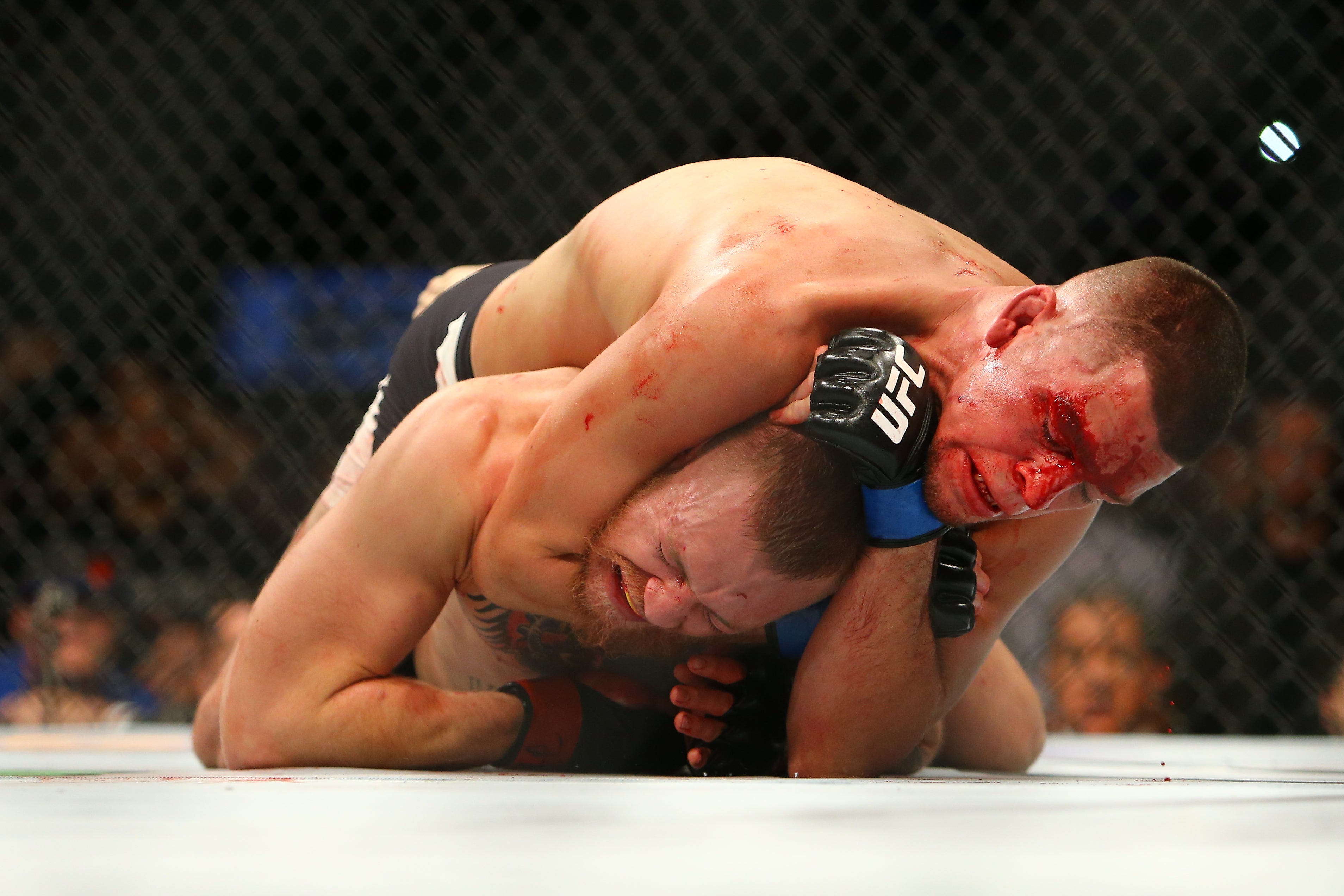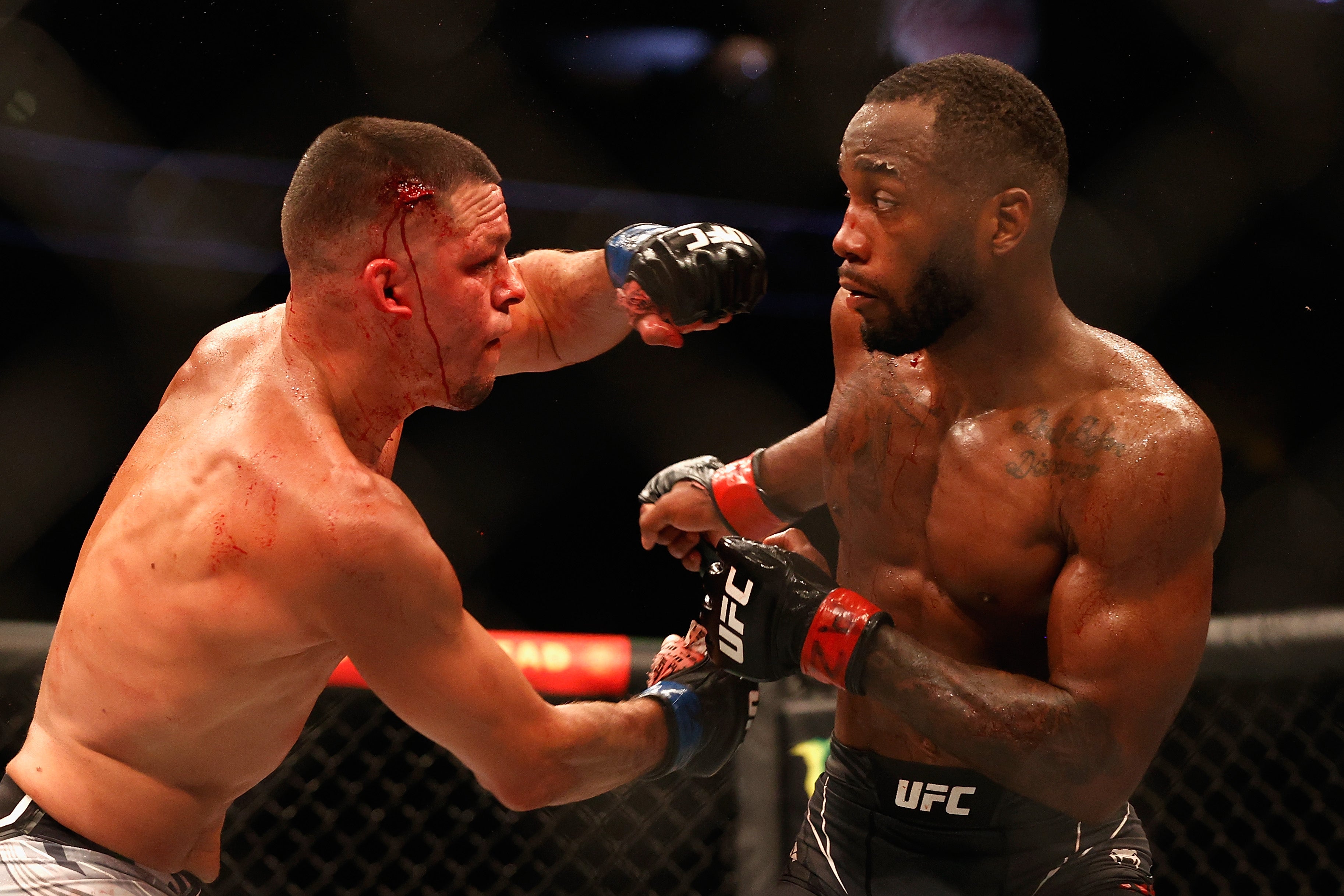
Picture Nate Diaz. If his face is not covered in a cascade of crimson, then you’re doing it wrong.
For that will be the lasting image of the American, the UFC’s great gunslinger who was often beaten, often bloodied, but remained – in his own word – “undefeated”.
When Diaz was paired with Khamzat Chimaev in UFC 279’s original main event, the overriding feeling among the MMA fandom was that the 37-year-old was being put out to pasture. Diaz had long wished to get in the Octagon one last time to see out UFC contract, only to be put on ice for more than a year after losing to now-welterweight champion Leon Edwards last June. The option presented to the fan favourite was this: Chimaev or no one.
For context, Chimaev was at the time unbeaten at 11-0, the 28-year-old having won his first 10 bouts via finish and having remarkably absorbed just one significant strike in his first four UFC outings. While his subsequent decision win against ex-title challenger Gilbert Burns this April finally made Chimaev look human, it also proved the Russian-born Swede’s pedigree.
So, when the UFC’s fastest-rising star missed weight last Friday, a little over 24 hours before his scheduled welterweight clash with Diaz, the American’s reaction was no doubt: ‘Still undefeated.’
“If u can’t make it to war u lose the war,” he famously tweeted in late 2018, when Dustin Poirier suffered an injury that ruled him out of a fight with Diaz, whose own 21-13 record seemingly means little to the Stockton native or his supporters. In Diaz’s mind, Chimaev’s failed weight-cut was as much of a victory for the 37-year-old as his own actual win against Tony Ferguson one day later.
Chimaev had scorched past new opponent Kevin Holland with a first-round submission moments earlier, in a manner to suggest that he would have brutalised Diaz, but it did not matter; UFC 279 will go down as a celebration of Diaz, who snatched Ferguson’s neck the moment his compatriot took him down in Round 4, locking in a guillotine choke while simultaneously unlocking those UFC-brand shackles.
Diaz vs Ferguson was a fight that fans had long hoped to see, and few at the T-Mobile Arena in Las Vegas seemed to care that it was ultimately a sloppy affair between aging icons. Diaz, for what it’s worth, was the sharper fighter, edging most of the striking exchanges before the decisive moment in the fourth round.

And therein exists one of the key ingredients to the Diaz enigma; the American never challenged for a UFC title – or even came particularly close – but still managed to earn definitive, monumental wins against world champions.
Ferguson’s peak exists only in the past tense, but the 38-year-old won 12 fights in a row in a seven-year stretch from 2013 to 2020 that saw him become interim lightweight champion. Just four months ago he was outperforming a former three-time world champion in Michael Chandler, before succumbing to one of the greatest knockouts in UFC history. If Diaz specialises in sporting blood, “El Cucuy” specialises in drawing it. Yet Diaz remarkably survived unscathed at UFC 279, to frustrate the author of this article and its intro and put away Ferguson in clinical fashion.
Then there is Anthony Pettis, a former undisputed lightweight champion whom Diaz comfortably outpointed in 2019 after two years and 362 days out of the Octagon.
Almost exactly three years prior, Diaz had contested one of the all-time great UFC contests with Conor McGregor, narrowly losing on points to the then-featherweight champion, who would claim a second title in a different division three months later.
But Diaz had already conjured his crowning moment that March, stepping in on short notice to face McGregor in the main event of UFC 196, where the American survived the Irishman’s inevitable first-round onslaught to choke McGregor into submission in Round 2. Few had given Diaz a prayer. He didn’t need one.

“I’m not surprised motherf*****,” Diaz insisted in his post-fight interview, in a moment that will forever remain a part of his legacy, along with the viral callout that opened the door to a clash with McGregor in the first place.
Days after McGregor’s 13-second KO of Jose Aldo in December 2015, Diaz defeated Michael Johnson and was asked by UFC commentator Joe Rogan to judge his own performance. “F*** that,” Diaz replied. “Conor McGregor, you’re taking everything I worked for, mother f******. I’m gonna fight your f******g a**. You know what’s the real fight, what’s the real money fight: me. Not these clowns that you already punked at the press conference. Ain’t nobody want to see that. You know you can beat them already, it’s an easy fight. You want the real s***, right here.”
And it was the real money fight, emerging as the highest-grossing pay-per-view in UFC history. That record would stand for just five months, when the event was eclipsed by UFC 202: McGregor vs Diaz II. A trilogy bout between the rivals remains on the card to this day.
In recent years, non-title-fight UFC main events have been incredibly few and far between, yet Diaz has featured in four of them – two without McGregor, against Ferguson and Jorge Masvidal, in a testament to his own star power. The Californian’s clash with Edwards in June 2021 was also the first ever five-round fight in UFC history to neither serve as a main event nor see a title contested. Even in defeat that night, Diaz was a ‘winner’, almost overriding four minutes and 50 seconds of dominance by Edwards when he stunned the Briton with a right hand in the final moments. That was what fans were talking about the following morning – not Edwards’ clinic.

There was a time when Diaz’s career seemed certain to play out in the shadow of his older brother’s; Nick Diaz was a two-time UFC title challenger, after all, and has always been similarly beloved by fans despite possessing a similarly patchy record to his younger brother’s. Instead, Nate’s star began to burn brightly enough to dwarf Nick’s shadow, though the younger Diaz brother’s post-battle cry of “Nick Diaz army” continued to sound after each of his own victories, including Saturday’s.
In the era of McGregor, Diaz established himself as the second-biggest star in MMA but arguably the most admired. Across 15 years in the UFC, his cult following gave way to an international fanbase that will await his next move – his first outside the UFC since 2006 – with great anticipation.
So, forget the record, but remember the blood, the soundbites, the upsets. Nate Diaz’s legacy may just be the most unique in UFC history.







